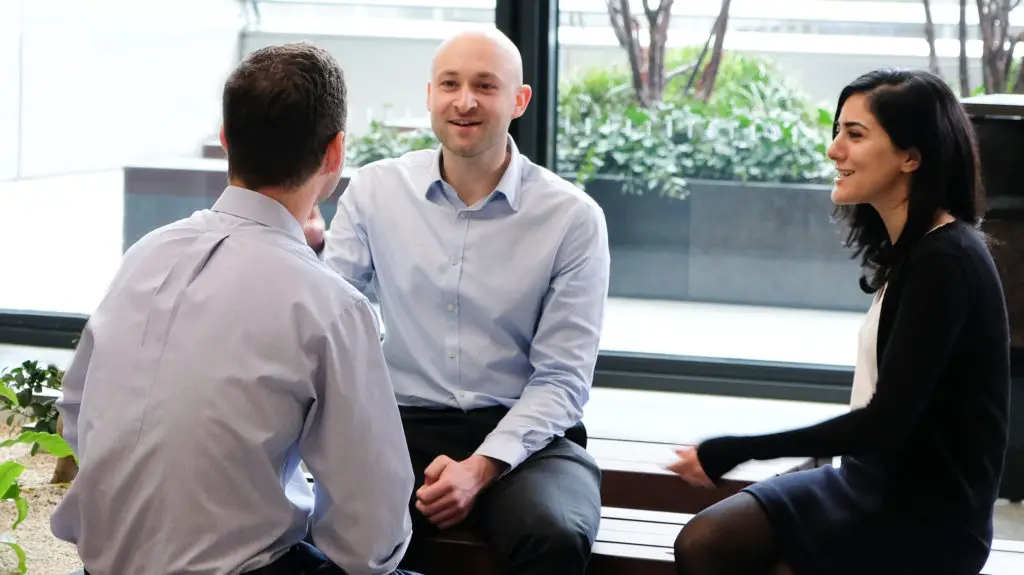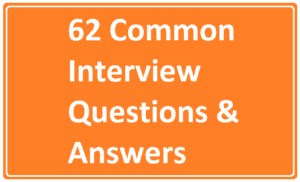Success depends on the preparations.
The little things which come together during the job interview will create a positive or negative picture that will decide whether to offer a job or not. Do not rely solely on your charm, your flatulence or the numerous trump cards that you think you have up your sleeve.
Also remember: Nobody can conjure up a good self-presentation within minutes. You have to do a huge part of the preparation as early as possible, i.e. while you are writing your application. As soon as you are shortlisted and have been invited to the interview, you concentrate fully on the training and the organizational details in order to be able to call up your best performance on your first day at the office.
Get to work right away. Use our examined and experimented, job preparation tips for the job interview and get the best out of yourself.
- THE INVENTORY
- The applicant profile
- The job profile
- The company profile
- THE RED THREAD
- The self-presentation
- The workout
- questions and answers
- ORGANIZATION AND TECHNOLOGY
- Interview on the phone
- Video interview
- Personal interview – as an individual interview or in the assessment centre.

1. The inventory
Are you honest, reliable, a team player, flexible, committed and punctual? Wonderful. The catch: 99% of the applicants also claim that of themselves. Paper is also very patient. So as long as you cannot establish a connection between your skills, the job requirements and the company itself, all those beautiful words are meaningless.
To prepare for your interview, you have to dig deeper like an archaeologist and find the “nuggets” relevant to the job. It is up to you whether you prefer to enter your research results in computer tables, index cards or mind maps. The main thing is that you have a good overview of your record.
The applicant profile
Who are you, what can you do and where do you want to go? A sheer career in management or an optimal work-life balance? Travelling around the world or family life with a home office? Down-to-earth master carpenter or pyrotechnician in Hollywood? If you’ve never really thought about your professional goals, do so now. “Where do you see yourself in 5 years?” Is part of the standard question of every HR manager.
Defining your own strengths, on the other hand, sounds easier than it is. Some overestimate themselves and give their school English the predicate “fluent”; others, on the other hand, are stacked too deep and would be perfectly able to give an English-language lecture on molecular biology. Incorrect assessments of this kind are quickly typed on the résumé, but do you also pass the practical test?
- Are you really creative or do you just like it quite attractive? Can you really lead people or are others afraid of you?
- What did your skills achieve? How did a project turn out to be good through your efforts? What were the savings (or additional profits) your skills made?
- Young professionals are allowed to draw on their private resources (club life, relevant hobbies, etc.) or share experiences during their studies.
- If you can’t think of anything: remember what other people (friends, colleagues, parents, …) appreciate about you. What do you get the most credit for?

How do I create my applicant profile?
- Question each of your strengths and abilities for accuracy and depth.
- Find at least one meaningful (and as current as possible) example of your previous career for each strength and ability.
- Mark three of your most important skills and three soft skills on your list, along with the corresponding success stories.
- Make a note of these key skills and examples on a separate sheet of paper and use them to create a powerful advertising message for yourself: your key message.
The job profile
Admittedly: Most job advertisements mainly consist of standard phrases and at first glance reveal only a few details. At second glance, however, you will find valuable information that is hidden between the lines.
Take a blank sheet of paper, divide it into four columns and analyze the display as follows:
- In the first column, you write in bullet points all the information that describes the current situation of the company Eg. (traditional company, high-quality lifestyle products, 300 employees, 10 million euros annual turnover).
- The second column contains all information relating to the future Eg. (investing in new technologies, expansion course, own Japanese branch established to open up the Japanese market, luxury segment).
- Third column: Which position is to be filled, in which department, to whom and what are the tasks Eg. (marketing manager for the new Japanese market, reporting directly to the management, …)?
- Fourth column: How is the ideal candidate described Eg. (Master’s degree, business fluent English, fluent knowledge of Japanese, willingness to commute between Munich and Tokyo, …)?
How do I create my job profile?
- Using your list, make a note of all the problems for which the company is apparently looking for solutions – otherwise, this position would not have been advertised (lots of initiative for development work, very demanding market, large cultural differences, need for advice, high coordination effort, etc.).
- Now draw the bow from you to this job offer:
- Can you solve these (assumed) problems with your key skills?
- What similar problems have you solved in the past? And how?
- Do you maybe even have the first idea of how to approach the problem?
- Where do you have gaps and how can you close them?

The company profile
An interview is not a blind date. The more you know about the company, its products or services and the people you are talking to, the better you can prepare your arguments when it says “Why should we hire you?”
Company websites provide you with a wealth of information on the company’s history, hierarchical structures, values and company philosophy. Are there people who stand out in particular?
If there is a customer magazine or a corporate blog, read the last 2-3 issues or entries from the last few months to find interesting facts, events or new products.
Focus on the core messages and keep the rest as the “atmosphere in the back of your mind”. A young start-up that programs hip app applications works differently than the long-established traditional brewery with strict hierarchical lines or the large Japanese corporation, whose German branch only speaks English.
The job profile helps you filter the information. As a future head of accounting, you are interested in the annual report of your dream company as well as the relevant business magazines, while you can score points in an advertising agency with knowledge of their campaigns.
How do I create the company profile?
- Make a note of the most important points in a separate list and sort the entries according to how important they are to the company. What is particularly emphasized? / What can be found in the job advertisement?/ What are the key messages?
- Then put another bow from you to this company. Search for similarities and complementary skills.
- Do you have any questions about the company? Write them down right away so that you can interview them.
2. The common thread
The better the grapes, the better the wine. This also applies to your self-presentation. When preparing, concentrate on your key skills – your best grapes, so to speak – and leave out everything that is unnecessary.
The self-presentation in the interview
“Tell me about yourself.” This request comes as surely as the amen in church, albeit sometimes in different words. Your conversation partner will want to see whether you can structure content clearly and argue convincingly.
What’s your story A good self-presentation in an interview is like a little story. It consists of:
- a beginning that arouses curiosity,
- a middle section that packs the details excitingly, and
- a crisp ending that delivers the punchline.
Be sure to also take note of the following advice from Henry Ford: “The secret to success is to understand the other’s point of view.” A story that is all about yourself may stimulate little interest.
Refer to the company’s values when speaking of your own; explain how you can use your key skills for the benefit of the company and which corporate goals can be achieved with them. Your red thread feeds on your strengths and the problems of the company.
The optimal length of your self-presentation is around two to three minutes. Less is more, you should definitely consider that. Your interlocutor will follow up if a topic interests him particularly.

The workout
Train your self-presentation for the interview until you can present it fluently and convincingly. It has proven useful to record every exercise run on video – if necessary, a sound recording is sufficient. Hone your text and rhetoric until you feel confident.
You can also ask friends to simulate an interview with you so you can get outside feedback. Let them try to confuse you with questions. If these interruptions irritate you, then work out a way how you can pick up the red signal.
Questions and answers
Whether business trips and weekend work, willingness for further training or salary expectations – think about these and similar questions in good time so that you can negotiate confidently in the conversation.
You can find more tips and examples for self-presentation in our article on self-presentation in an interview .
3. Organization and technology
Now that you are well prepared in terms of content, you can answer all questions convincingly and you have prepared a perfect self-presentation, you now take care of the organizational and technical preparation of your interview .
How you go about this depends essentially on the way in which you communicate:
- on the phone
- via video circuit
- in a personal one-on-one interview
- in the assessment center
The interview on the phone
Time is money. Telephone interviews are therefore a popular means of filtering suitable candidates for the interview. An invitation for a telephone interview signals interest in your application, but is not a reason to uncork the sparkling wine.
On the phone in particular, everything depends on your voice. Telephone interviews are therefore usually announced in writing. However, if a spontaneous call catches you cold, you can offer to call you back at short notice.
This gives you some time to collect yourself briefly and get your notes out. In order to avoid this scenario from the outset, you can include the following note in your application: “If you have any questions, you can call me on weekdays from 6:00 pm to 8:00 pm at [telephone number]”.
When do you have to expect a phone interview?
- Especially with demanding jobs, it is interesting which “league” you have played in so far. If your application was formulated too superficially here, HR managers are happy to follow up. What was the budget that you were solely responsible for? How many employees did you manage? What specific results did your project achieve and in what period of time?
- Do your skills match the requirements of the position? Language skills and communication skills are often tested over the phone.
- A reason for a telephone interview can also be contradictions or gaps in the curriculum vitae, as well as queries regarding desired salary or willingness to go on business trips or even move.
- Picking up the phone can also be a good option as the first contact for an unsolicited application. But this too should be thoroughly prepared. After all, you want to appear competent, interested and determined without leaving an intrusive or confused impression. Good preparation improves the chances of success.
How do you prepare for a telephone interview?
Your vote counts. It alone is decisive whether you can find a connection to the person you are talking to. A sleepy, hungover, or coughing voice is of little help. Speak naturally, not too loudly and not too softly. And with the good old mirror trick you make sure that you don’t forget the smile.
Timing: Telephone interviews usually last between 10 and 45 minutes. Plan enough time so that you have a buffer if necessary. Note the time difference if you have applied to a company abroad.
Environment: You need a quiet room in which you can make calls without being disturbed. Disturbing background noises are taboo. A no-go is, of course, to conduct the telephone interview at your current workplace. Your car or a coffee shop are also extremely unsuitable.
An empty desk with space for your application documents as well as a notepad, pens and a glass of water is ideal. While standing, your voice has more resonance and is more convincing, but if you feel more confident while sitting, that’s not a problem. Even if the person you are talking to cannot see you: Active body language has a positive effect on your voice.

Job interview via video call
If the physical distance between the applicant and the company is very large, video conferences are often held to make a pre-selection. This is especially true if you have applied abroad.
The first interview for your dream job in San Francisco will certainly not take place on-site but via video call.
Environment: In contrast to the telephone interview, the person you are talking to not only sees you but also the place where you are. Use a neutral, professional background. Offices and small meeting rooms in hotels can also be rented by the hour and tax-deductible.
Technology: You will usually be told in the invitation which technology will be used. You may need to install an app. Test the video application on your computer as early as possible. Take special care that everything works smoothly. If necessary, install the app on your tablet or smartphone in order to be prepared for any emergencies. And another tip for every video interview : Of course, the camera has to stay on.
Pitfalls: There are a few particularities with video calls that you should be aware of.
- To maintain eye contact, you need to look at the camera, not the screen.
- Remember that the person you are speaking to can see you even if you just take a few documents off the shelf and feel out of their reach.
- Dim candlelight is just as bad as bright neon lights that literally make you look old.
Collect plus points and demonstrate key skills: video systems have a lot of potentials to set yourself apart from other applications. During the conversation, you can split the screen into two areas that show you and your presentation. In some jobs, dealing professionally with multimedia is one of the key skills.

Personal interview
Done. The telephone interview or video call have you passed with flying colours and allowed to prove yourself in the supreme discipline: the personal interview. Whether it’s an individual interview or together with other applicants in the assessment centre – the preparation for the job interview is almost identical.
Technical questions usually play a minor role, while your soft skills and the skills that are essential for the job are put through their paces. In the following, you will find some tips for the interview so that nothing goes wrong.
Tips….
Travel planning:
- The greater the distance, the more remote the place and the worse the weather conditions, the more thoroughly you have to prepare for the journey and take all eventualities into account. Expect traffic jams and train cancellations. If your appointment takes place in the early morning, you should consider whether you should not arrive a day in advance at your own expense. Even the worst hotel is better than missing the appointment because of a train delay.
Travel expenses:
- Clarify in advance whether the company will pay for the travel expenses and what budget is available to you. Long distances are often replaced; the reimbursement of costs for flights and first-class train tickets are, however, the exception or depend on the respective position. The employment office also reimburses application costs.
Dress code:
- A well-groomed appearance is mandatory. But you don’t always have to appear in a suit or costume. In a creative start-up, things are usually more relaxed. The company’s homepage is a good guide. Often team photos or event reports are published that can give you a rough idea. You can also find more information in our dress code guide.
What do you bring:
- Most importantly, a notepad and pens, The choice of your work materials (loose slips of paper vs. elegantly bound notebook) says a lot about you. Your complete application portfolio is a loyal helper if you want to look up something. It is also advisable to have additional copies of your résumé in case other interlocutors attend your appointment at short notice. That shows that you think along.
Self-presentation
- is one of the most important parts of the interview. If you have already presented yourself in a telephone interview or via video, an encore is coming up. Be it to evaluate your body language and thus your demeanour or because new interlocutors have emerged. Now at the latest, good preparation pays off: If you have researched a lot and trained hard, you can use the red thread to present the same content in a slightly modified version.
Foreign language preparations
- If your job requires fluent knowledge of a foreign language, then be prepared for your interview to take place in this foreign language without prior notice. For jobs of this kind, you have to prepare and practice your self-presentation in the respective foreign language. Incidentally, exotic languages do not protect you from the language check, because a linguistic employee or interpreter can be found quickly.
Brain teasers
- are also very popular. So that you can prepare yourself for these puzzles, we have dedicated a separate article to the brain teaser in the interview.
The 9 most important tips for your success
On the way to your dream job, you can easily step in a quick entry and consequently get out of the race early. So that this doesn’t happen to you, here are the most important tips before your interview :
- Find your key skills and outline in an exciting self-presentation how you can help the company solve its problems.
- Train your self-presentation until you can present it convincingly and, if necessary, vary it spontaneously.
- Define your desired salary and your ideal working conditions and write down all the questions you have about the company and the area of responsibility.
- Reserve enough time for your interview and pay attention to the time difference in companies abroad.
- Find a quiet room for phone interviews and video calls and make sure that you are not disturbed.
- Test the compatibility of the video app with your computer system and check the microphone and camera settings.
- Always look at the camera for eye contact.
- For personal interviews, ensure a stress-free journey in good time so that you are on time and relaxed on-site.
- Always stay authentic.
To find Jobs in Middle east kindly Visit Anygulfjobs.com





























